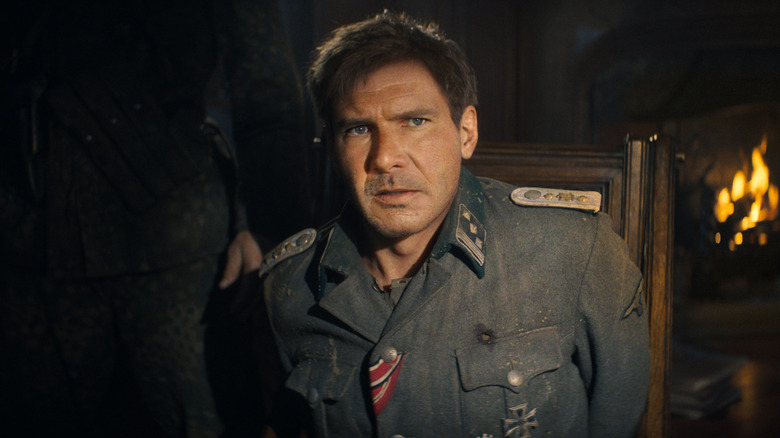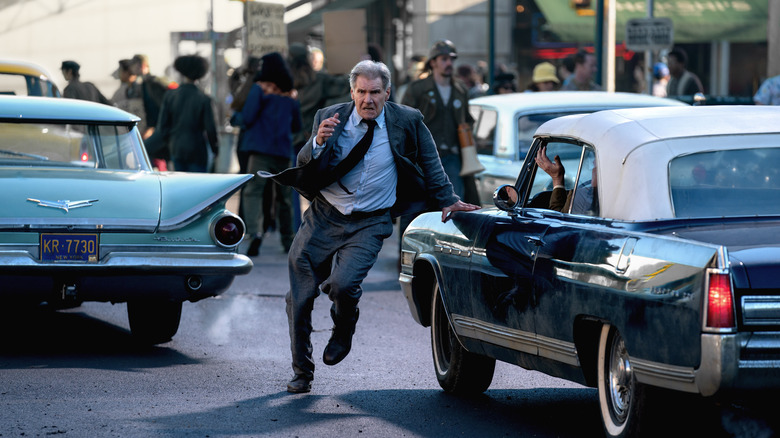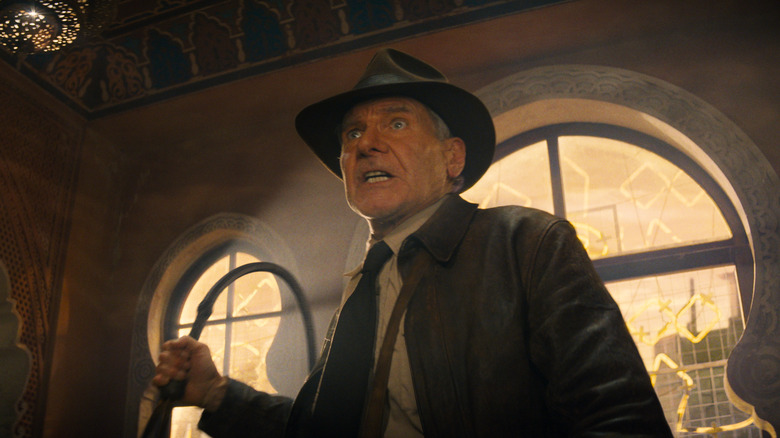Indiana Jones 5: The Two Loose Ends That Needed Big Payoffs
Contains spoilers for "Indiana Jones and the Dial of Destiny"
After fifteen years away from the silver screen, Indiana Jones (Harrison Ford) is back!
Years of anticipation have finally led to the release of "Indiana Jones and the Dial of Destiny," the fifth film in the Lucasfilm franchise. The first in the saga to be directed by James Mangold, "Dial of Destiny" sees Jones as an old man on the verge of retirement, ready for his most important adventure yet. In the flick, Jones is roped into an adventure by his goddaughter Helena (Phoebe Waller-Bridge) to stop nefarious Nazis from using the Dial of Destiny — an artifact he's meant to destroy at the behest of his best bud Basil Shaw (Toby Jones). This is an Indy adventure and, naturally, things get a bit hectic, chaotic, and spooky.
/Film critic Lex Briscuso praised the film for its swift action sequences, inviting narrative, and arresting performances, with Bricuso describing Ford's final hurrah as "beyond triumphant" as the iconic Dr. Jones. Like all films, "Dial of Destiny" isn't perfect, and fans have a few issues with how the film wraps up. Taking to Reddit, user u/Massive_Number_3230 was a bit dumbfounded by how the murder subplot was left abandoned. "What happened to Indy and the authorities at the end? Wasn't he wanted for murder?" they asked. Indeed, "Dial of Destiny" isn't concerned with wrapping up the shocking amount of deaths and murders that mounted up throughout the feature, as Indy returns to his apartment in the finale, reunited with his loved ones.
While some fans were disappointed with how the murder situation wasn't resolved, others were taken aback by how Jones never destroyed the Dial of Destiny despite seeing firsthand how dangerous it is. "What happened to Indi promising to destroy the dial as well?" a fan questioned in the same Reddit thread.
Fans are worried about Indy's murders
While "Indiana Jones and the Dial of Destiny" does function as a solid farewell to the iconic archeologist, it doesn't necessarily have the payoff that fans wanted, especially when it comes to the film's wanton treatment of murders and Indy's lax attitude towards the titular MacGuffin. "It was such a useless plot point," user u/MrStevenRichter said of the unresolved manhunt for Jones. "Being wanted for murder doesn't stop Indy from hopping on a plane (the same day his face was on the news) [...] Like if Indy took the subway to a police station and explained everything, this probably could have all gone away," they wrote. Of course, when Jones returns to the present day after having used the Dial of Destiny, there's no mention of his fate, at least from a legal perspective.
Luckily, user u/JuniorCaptain was paying attention and had a solid explanation regarding the lack of payoff. "When the CIA agent was extracting Voller's team, she said they were pulling the plug on his side project because it had caused civilian deaths, so I'm guessing she passed the word along to the local authorities," they wrote. Does that make sense? Not to some fans, who describe the arrangement as "incredibly odd."
User u/cheekabowwow says that Indy "had the Dial of Destiny and Helena Shaw," meaning "he can now present them as his get out of jail free card..." While that's certainly a valid point, the existence of the Dial of Destiny undermines one of the most important moments in the film when Basil tells Indy to destroy the ancient artifact.
Why didn't Dr. Jones destroy the Dial of Destiny?
Indiana Jones should have destroyed the Dial of Destiny. After witnessing firsthand just how dangerous the device is, it makes sense that Indy would have turned it to dust, preventing any future Nazis or disastrous forces from seeking it out. Jones also makes it explicitly clear that he'll destroy it for the sake of Basil, an adventurer who lost so much of his waking life in search of the artifact. Then again, Jones doesn't have much incentive to destroy it. Viewers, particularly on the "Indiana Jones" fan subreddit, have pointed out that Indy is the only individual who truly knows the ins and outs of the Dial of Destiny. "It really shows Indy's intelligence that he proved the dial wouldn't work as intended within twenty or so minutes of him actually knowing it worked," shared u/YoungBeef03.
Dr. Jones immediately accounted for continental drift and the fact that all roads literally lead to Archimedes (Nasser Memarzia). "Archimedes can only finish the dial because he saw the completed one Indy brought + witnessing the fissure [...] So Indy's destiny is linked forever with Archimedes," wrote u/functions-and-glory. It would have been interesting for Indy to comment on the fact that the Dial of Destiny is linked directly to Archmides' coordinates, meaning he can always be visited. If anything, acknowledging that would have been a satisfying conclusion for Basil's arc, with Jones discussing how the possibility of always returning to ancient B.C is a tantalizing and life-affirming offer. Despite "Dial of Destiny" failing to tie up two if its loose ends, it's still a worthy "Indiana Jones" adventure that's bids farewell to its iconic lead.


